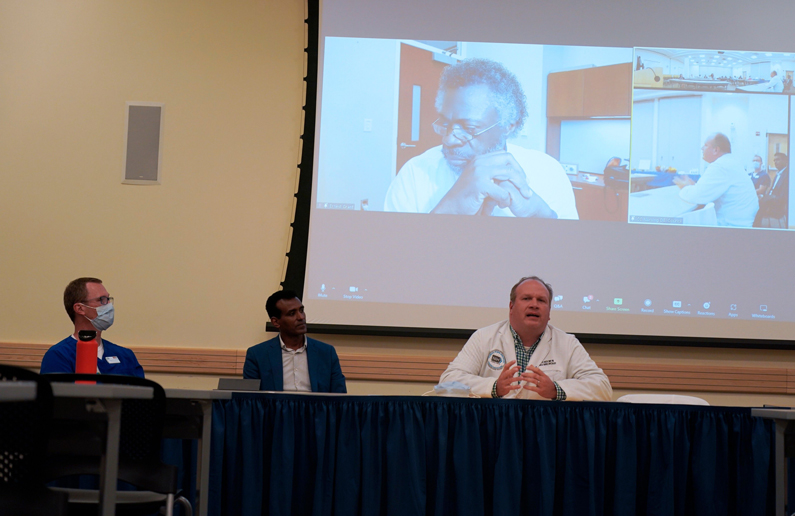Men in Nursing discussion addresses rewards and challenges

Dr. Steven Risch began his nursing career as a 21-year-old RN in a cardiac surgery intensive care unit in upstate New York.
Now a Clinical Center oncology clinical nurse specialist, he is still a relative rarity in a profession that remains predominantly female.
In the U.S. today, nearly 9 out of 10 nurses are female, despite the fact that the number of male nurses has climbed 40 percent in the past 20 years, according to the U.S. Bureau of Labor Statistics.
Risch was one of three CC male nurses to reflect on their professional experience during a Sept. 27 "Men in Nursing" event sponsored by the CC Nursing DEI Council.
The event featured a keynote address from Dr. Ernest Grant, a male nurse and internationally recognized burn-care expert. In 2018 Grant became the first male president of the American Nursing Association. He now serves as a vice dean at the Duke University School of Nursing.
In a subsequent interview, Risch said the event was "very validating," noting that it marked the first time in his 23-year career that he encountered a program dedicated to the topic of men in nursing.
"The [CC Nursing] Diversity, Equity and Inclusion Council here is really robust," he said. "They're doing a phenomenal job raising awareness with different aspects of diversity and inclusion."
Recruiting more men into the nursing profession could help address the country's persistent shortage of nurses, a gap that is only expected to increase in the years ahead.
Of the nearly 3.9 million nurses working in the U.S. today, nearly 1 million are over the age of 50 and will soon approach retirement age.
Dr. Barbara Jordan, the NIH Clinical Center's chief nurse officer, also spoke during the "Men in Nursing" event.
Jordan said she's always appreciated the compassion, caring, and sensitivity of her male nursing colleagues, adding that they are "supersmart, great problem-solvers and really help balance the team."
Risch shares his own anecdotal evidence that more men looking to change fields mid-career are recognizing the growth and personal satisfaction offered by nursing.
Still, negative stereotypes persist. Risch points to presumptions about sexuality and the dearth of male nurses in the most senior management positions.
At the Clinical Center, Risch writes evidence-based treatment protocols to ensure nursing staff provide the best possible care.
He says he finds the work intensely satisfying. "That combination of patient care and nursing and [the ability] to deliver that at the bedside is really the most rewarding part for me."
Grant, the "Men in Nursing" keynote speaker, echoes that sentiment.
"I enjoy helping my fellow man," he said. "One of the questions that I ask myself every day at the end of the day is, did I make a difference today? Every day since I've been a nurse, I think I can truly answer that question, yes."
Video from the event is archived and available online.
- Sean Markey